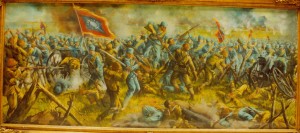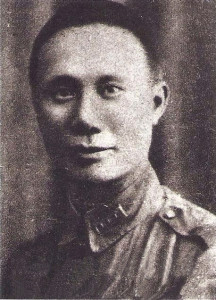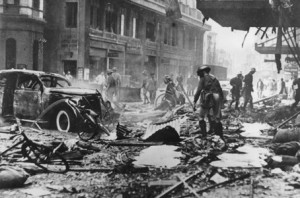The Battle Erupts (II)
- By Peter Harmsen
- 14 August, 2013
- 18 Comments
 “Launch the assault.” This was in essence the message sent from supreme Chinese leader Chiang Kai-shek to his frontline commanders near Shanghai during the night between August 13 and 14. A small Japanese garrison was holed up inside China’s largest city, and Chiang hoped a decisive blow by his elite 87th and 88th divisions could wipe them out.
“Launch the assault.” This was in essence the message sent from supreme Chinese leader Chiang Kai-shek to his frontline commanders near Shanghai during the night between August 13 and 14. A small Japanese garrison was holed up inside China’s largest city, and Chiang hoped a decisive blow by his elite 87th and 88th divisions could wipe them out.
The Chinese troops spent the first half of August 14 preparing for the upcoming operation, launching the attack in mid-afternoon. The main objective was the Japanese marine headquarters, a highly visible symbol of Japan’s presence in Shanghai. But the offensive immediately ran into problems, not least because of the deadly efficiency of Japan’s naval guns in the nearby Huangpu River. Fatalities were high throughout the Chinese ranks, as this excerpt from the newly published Shanghai 1937: Stalingrad on the Yangtze shows:

Huang Meixing
“Towards 5:00 p.m. Major General Huang Meixing, the 41-year-old commander of the 88th Infantry Division’s 264th Brigade, was leading an attack in the vicinity of the marine headquarters. His divisional commander Sun Yuanliang tried to contact him on the field phone, but was forced to wait. When he finally got through to Huang, he cracked a rare joke. ‘It took so long I thought you were dead,’ he said. Just minutes afterwards, as if fate wanted to punish Sun Yuanliang for this bit of black humor, Huang Meixing’s command post was hit by an artillery grenade, killing him instantly.”
But the real bloodbath of August 14, later known as “Black Saturday,” took place inside Shanghai’s foreign districts. On two locations, Chinese planes attacking the Japanese flagship in the harbor accidentally dropped bombs in streets crowded with civilians. The result was carnage. Here the scene in Nanjing Road, according to Shanghai 1937:

Nanjing Road after the bombing
“A sickening stench of burnt flesh filled the air. As the wounded came to, they started moaning. Some were screaming. Part of the façade of the Palace Hotel had been blown away. On the fourth floor, a man clung desperately to the remains of the wall with one hand, waiting for help. It came too late, and he eventually let go, crashing through the glass awning of the hotel’s entrance before hitting the pavement. Others attempted to crawl to safety, scrambling with fumbling limbs over mangled bodies and slipping in the blood that covered the sidewalk.”

 Copyright © 2025
Copyright © 2025
Leave a Reply